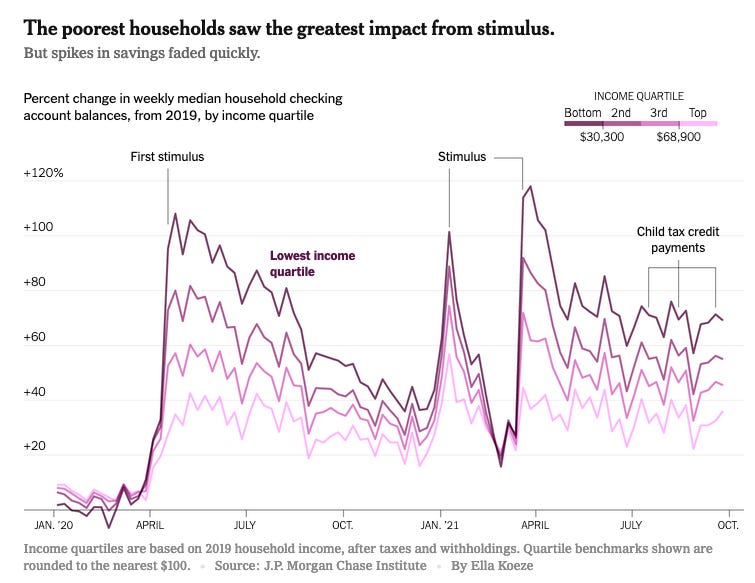🌀🗞 The FLUX Review, Ep. 34
January 13th, 2022
Episode 34 — January 13th, 2022 — Available at read.fluxcollective.org/p/34
Contributors to this issue: Justin Quimby, Erika Rice Scherpelz, Alex Komoroske, Neel Mehta, Dimitri Glazkov, Spencer Pitman
Additional insights from: Ade Oshineye, Gordon Brander, a.r. Routh, Stefano Mazzocchi, Ben Mathes, Boris Smus, Robinson Eaton
We’re a ragtag band of systems thinkers who have been dedicating our early mornings to finding new lenses to help you make sense of the complex world we live in. This newsletter is a collection of patterns we’ve noticed in recent weeks.
“What makes it unbearable is your mistaken belief that it can be cured.”
— Charlotte Joko Beck
🏤📥 Centralization and APIs
What is an API? The literal definition is that, “an application programming interface (API) is a connection between computers or between computer programs. It is a type of software interface, offering a service to other pieces of software.” More broadly, an API is a way to create legibility between different pieces of software. Because software cannot discuss how to resolve ambiguities (yet!), well-specified APIs are crucial to allowing different pieces of software to interact. It’s closer to two mathematicians talking than to two authors.
One way to look at the history of computing is that the increasing scope of APIs has allowed us to build more and more powerful programs. Microprocessor instructions and assembly languages abstract away pure bit manipulation. Increasingly-sophisticated programming languages and compilers abstract away the details of machine architecture. Standardized interfaces create compatibility by abstracting away hardware differences. Increasingly-rich semantic APIs allow whole applications to be assembled from building blocks that can do everything from displaying data to managing payments to causing things to be shipped in the physical world. Web3 constructs like smart contracts and DAOs offer a vision where APIs add the power of governance.
When we create an API, we delegate authority to the API. However, APIs are inherently incomplete. Sometimes this is because of bugs or a lack of foresight. But, ultimately, no specification can handle every use case that reality throws at it. When this happens, we often add more details to the API. These details, in turn, increase the complexity of the system, leading to a brand-new set of corner cases.
These edges and gaps become fertile ground for innovation. Sometimes that innovation is good, such as when users find ways to use social software to get around the demands of oppressive regimes. Sometimes that innovation is bad, such as code exploits that exploit access to steal data and money.
Because APIs are inherently limited, these gaps often become the seed crystals for centralization. Centralization happens in places that are not made legible by an API. Someone sees the gap and fills it in with something that is outside of the API. Just as aggregators filled the gap between producers who created content/products and consumers who needed to know what fit their needs, gaps in new APIs will create new opportunities for centralization.
Do not be seduced by the idea that we can reduce all computation to programmatic APIs. We have realized huge efficiencies by increasing the scope of APIs. As we continue to find ways to standardize and specify interactions, we will find even more opportunities. However, we should always be on the lookout for the gaps and edges we are creating. If we do not plan to fill those gaps, they will be seized by whoever else gets there first.
🛣️🚩 Signposts
Clues that point to where our changing world might lead us.
🚏🦀 Coastal animals are hitching rides on microplastic rafts in the open ocean
The oceans are home to giant floating “rafts” of clumped-together plastic waste, and because plastic doesn’t biodegrade, these rafts have become durable habitats for many marine species. Researchers have found that many animals that were previously restricted to the coast have been able to thrive on these artificial “coral reefs” in the open ocean, forming never-before-seen “neopelagic” ecosystems — though scientists worry that this might help spread invasive species to distant shores.
🚏🛬 An airline group flew 18,000 near-empty flights to keep its spots at major airports
The EU has a “use it or lose it” policy for flight scheduling: if an airline doesn’t use a certain percentage of its allotted take-off and landing slots at a given airport, it’ll forfeit those slots. But travel demand remains low. So the Lufthansa Group — which owns Lufthansa and a half-dozen other European airlines — has run 18,000 empty or near-empty flights this winter just to keep its coveted airport slots.
🚏🏦 Americans’ stimulus-powered savings are still around, though they’re fading
The 2020 and 2021 stimulus checks massively grew many Americans’ savings; the changes were especially pronounced for lower-income households. Americans’ bank balances are still higher than they were pre-pandemic, though the effect seems to be fading with time.
🚏🏴☠️ An open-source developer broke many projects by publishing corrupted library versions
The developer of two popular Node.js modules — faker.js, relied on by 2500 projects, and colors.js, used by almost 19,000 — published updates that corrupted the two modules. Instead of working as intended, these would print an ASCII-art American flag and enter an infinite loop, crashing any project that relied on them. Earlier, the developer had written:
“Respectfully, I am no longer going to support Fortune 500s (and other smaller sized companies) with my free work… Take this as an opportunity to send me a six figure yearly contract or fork the project and have someone else work on it.”
🚏👩⚖️ One startup wants to crowdsource funds to mount lawsuits, then share the profits
A crypto startup is launching what it calls “Initial Litigation Offerings,” where it will sell crypto tokens to raise money for proposed lawsuits. If the plaintiff wins the case, token holders will earn a share of the payouts. Litigation crowdfunding has existed before (and the market attracted $2.5 billion in investments from June 2019 to June 2020), but the startup says that the crypto angle will let less-wealthy investors participate and will increase liquidity by letting investors buy and sell tokens before the lawsuit concludes.
🚏☀️ “Nailable solar shingles” aim to make solar roofing easier to install
One green-energy startup has developed shingles that double as miniature solar panels. The startup says that installing traditional roof-mounted solar panels is usually quite labor- and material-intensive, taking a team of up to 12 people multiple weeks to install and requiring additional equipment like rails to mount the panels on. Instead, the company claims its shingles can be installed just like classic shingles — just nail them onto the roof — and take just a few days to put in place.
🚏🇰🇷 A South Korean presidential candidate is raising funds using NFTs
Lee Jae-myung, the ruling Democratic Party of Korea’s candidate for the 2022 presidential election, has announced that his team will be giving NFTs to people who donate to his campaign. The tokens will include pictures of Lee and his political platform. This strategy is Lee’s latest move to appeal to the youth vote, coming on the heels of his publicly-announced support for using NFTs to bolster South Korea’s gaming industry.
📖⏳ Worth your time
Some especially insightful pieces we’ve read, watched, and listened to recently.
Could Microclots Help Explain the Mystery of Long COVID? (The Guardian) — Discusses research that suggests that “Long COVID” patients’ weakness and lethargy are a result of the virus interfering with the blood’s ability to break up clots, causing cells to receive insufficient oxygen. Traditional lab tests may not be able to detect this behavior.
Up and Down the Ladder of Abstraction (Bret Victor) — A well-illustrated primer on how to visualize and model complex systems for the purpose of designing algorithms. Writes that we can build intuition for a system by fluidly shifting between more abstract and more concrete representations, and that our model and algorithm will co-evolve as we get to know the system’s dynamics better.
The Enlightenment is Dead, Long Live the Entanglement (The Long Now Foundation) — Asserts that the tools of inquiry, observation, and reason have converged with networks of thoughts, information, and commerce to create an “age of entanglement” where we no longer singularly control these systems — instead, we interrelate and “bargain” with their dispositions.
Why Longtermism is the World’s Most Dangerous Secular Credo (Aeon) — Proposes that the answer to our apocalyptic worries is not “longtermism” (a gaze at the multi-millennial implications of our current actions), since this philosophy easily provides escape from grappling with the near-term implications of our species’ decisions.
Procedural Storytelling Is Exploding the Possibilities of Video Game Narratives (The Verge) — Delves into the world of video games with randomly-generated characters, scenes, and/or plotlines; explores the beautiful emergent narratives that can arise from the apparent randomness; and examines techniques like “story sifting” that game designers use to make this bottom-up approach to narrative-building work.
The Raven Paradox — A Hiccup in the Scientific Method (Up and Atom) — Describes the “logical empiricism” movement that birthed the scientific method, explores how philosophers of science responded to a famous paradox in logical empiricism, and concludes that science needs to be paired with context if it’s going to be useful.
Cherish Your Q1 Friends (Tim Urban) — The creator of “Wait But Why” shares a graphic that uses a 2x2 matrix to classify friendships along the axes of enjoyment and healthiness, and shares tips on how to identify where on the map a friendship falls.
📚🌲 Book for your shelf
An evergreen book that will help you dip your toes into systems thinking.
This week, we recommend Four Thousand Weeks: Time Management for Mortals by Oliver Burkeman (2021, 290 pages).
If, glancing at this book’s title, you’re expecting a book full of life hacks to maximize one’s efficiency, you might be disappointed. Instead — and thankfully — Burkeman focuses on the inherent finiteness of each human’s time on this Earth, and how focusing on efficiency will lead you to spending more of that limited time on the things that matter the least. The author suggests that people let go of the impossible goal of doing everything and focus on the things that matter most. Burkeman pulls together a number of highlightable quotes and interesting perspectives from a broad menagerie of thinkers into an easy-to-read and thoughtful synthesis that encourages us to challenge some of our implied assumptions about how to live your life to the fullest.
🕵️♀️📆 Lens of the week
Introducing new ways to see the world and new tools to add to your mental arsenal.
This week’s lens: compounding loops.
Compounding loops are cycles of causal relationships where the quantity of a measured outcome at a given point in a cycle depends on the output of the previous point in the cycle. The most common — and overused to the point of banality — examples of compounding loops are flywheels: more of one thing leads to more of another thing, which eventually leads to more of the very thing we started with.
A well-described property of a compounding loop is its exponential growth. Growth is usually considered a good thing in the world of business, but as our experiences with global pandemics show, it ain’t necessarily so. Compounding loops are a quality of a system, and their effects can be both fantastic and terrifying. For example, a product that is selling like hotcakes might be driven by the compounding loop of users raving about it to their friends. When alarming quality concerns are raised, the same loop will run in reverse and ruin the product.
That’s one thing we can always expect from compounding loops: they are never boring. They are surprising, feeling unpredictable and difficult to see, especially at first. A keen systems thinker often finds themself in a role of a “compounding loop Cassandra,” pointing at a seemingly-tiny thing that nobody pays attention to — until it smacks everyone in the face.
Every time we see a metric line starting to curve, chances are we’re seeing a compounding loop at work. Whether we imagine the hockey-stick growth of our new product or lament that “the bottom fell out,” we are describing the effects of some compounding loop. Understanding the nature of the compounding loops behind our metrics, hopes, and fears can be incredibly useful. After all, it’s better to ride the compounding loop than be ridden by it.
🔮📬 Postcard from the future
A ‘what if’ piece of speculative fiction about a possible future that could result from the systemic forces changing our world.
// The COVID-19 pandemic, along with the presidential election of 2020, saw a steady loss of trust in public institutions. What impact might that have on Americans born after the turn of the century, and how might they respond to the tensions that’ll face America in the late 2020s?
// January 2045. A modest room, with two people sitting on either side of a table. Security stands in the corner.
“Thanks for agreeing to this first interview. I’m Dr. Caro, a historian working to document the ‘American Times of Trouble’ between 2025 and 2031.” Dr. Caro cracks open a notebook and clicks open a pen.
Syme smiles. “A doctor, huh? How’s your student loan debt?”
Dr. Caro chuckles. “Ah, yes. I’ve read one of your screeds on the US educational debt system — and I have you to thank for my lack of it! Did you have a lot of debt prior to 2025?”
Syme laughs. “Debt? Are you kidding me? In 2021, the average American had $90,000 in debt, with over $1.7 trillion in total educational debt nationwide. And when the dust finally settled from the multiple COVID waves by the end of 2023, folks under 40 had on average an additional $42,000 in medical debt if you include all the bailouts to the drug companies!”
Dr. Caro pauses. “You have those numbers at the tip of your tongue. How did you get your financial education?”
Syme snorts. “Education. That’s an interesting word choice. I learned in elementary school that when a school shooter event happens, you have to run, hide, fight. When I turned 10, my uncle gave me a backpack with bulletproof plates in it. When I was in junior high, we started seeing books get pulled from the library because they ‘taught the wrong things’. And during the four years of successive COVID waves, public schools were beyond useless. We sat in auditoriums, wondering who around us was infected. We watched teachers run from rooms crying with symptoms. Remote learning was a joke.
“My education came from Discord, Telegram, TikTok, and Instagram. That’s where I learned how much our local, state, and federal leaders didn’t have a clue. And when the 2024 election devolved into a complete farce, well… that was an education too.”
Dr. Caro: “What was most surprising about that time for you?”
Syme: “Almost every public institution or check and balance seemed to fail within a year. The news media didn’t hold the government accountable. Minority rule became the norm at all levels of the legislative branch. The judicial system lost its illusion of impartiality. We watched videos of local police fighting units of the national guard. And grifters and cult leaders sprang up like mushrooms after a heavy rain. There was no one to trust except ourselves. That’s when we had to make some changes…”
// Choose your own adventure time!
Read the pessimistic ending to this postcard
Read the optimistic ending to this postcard






